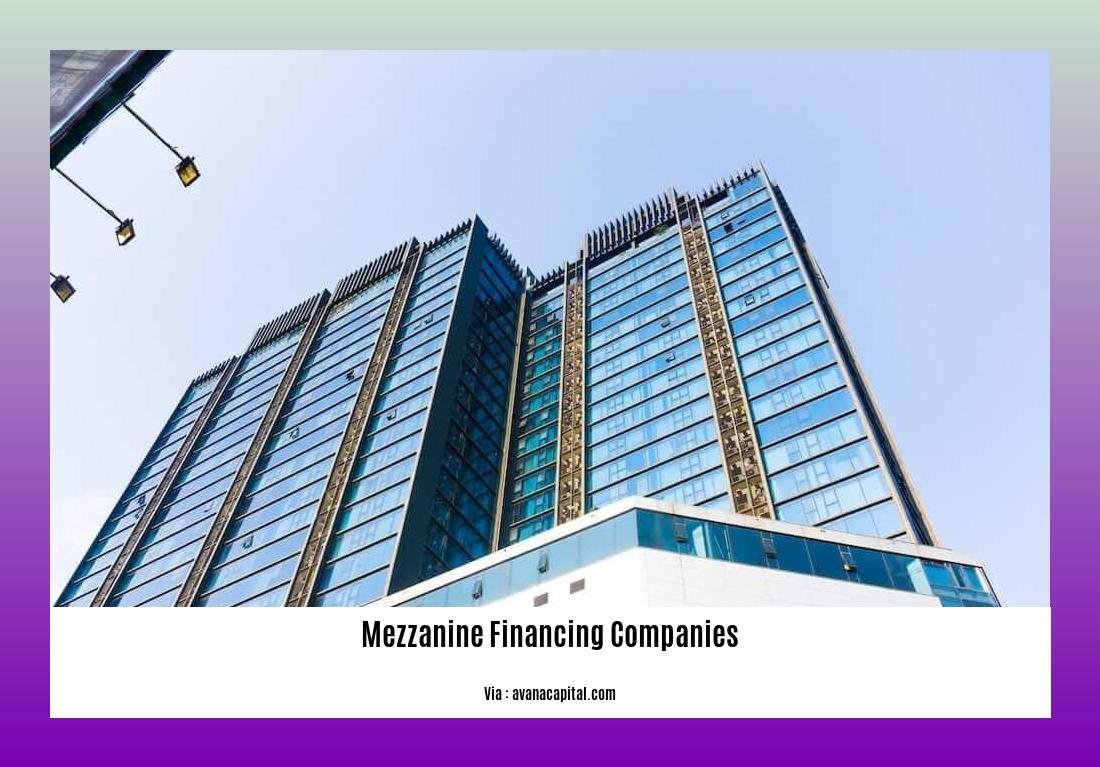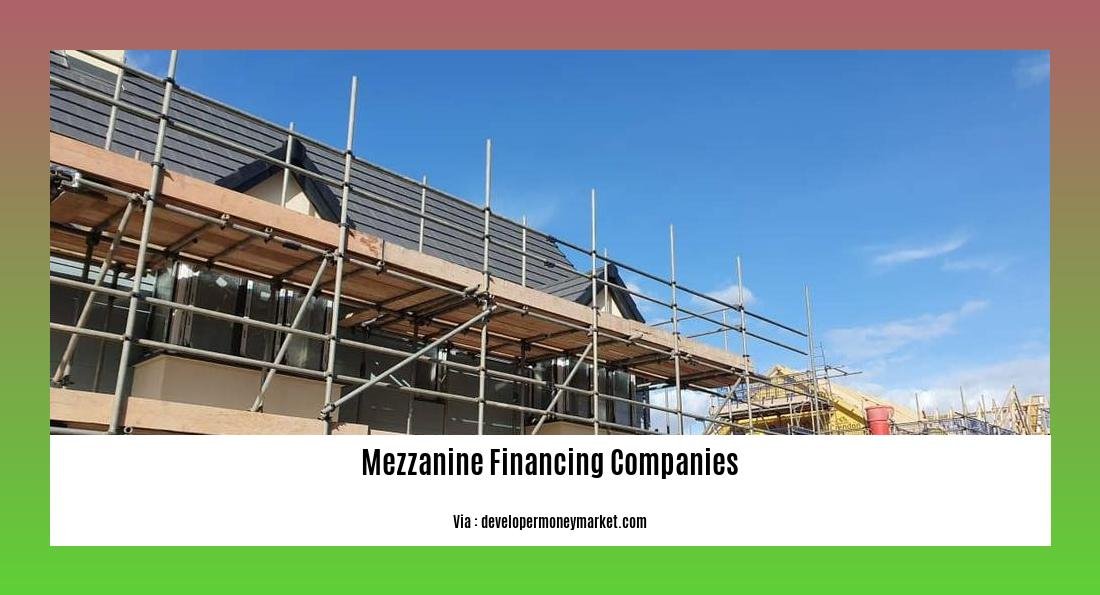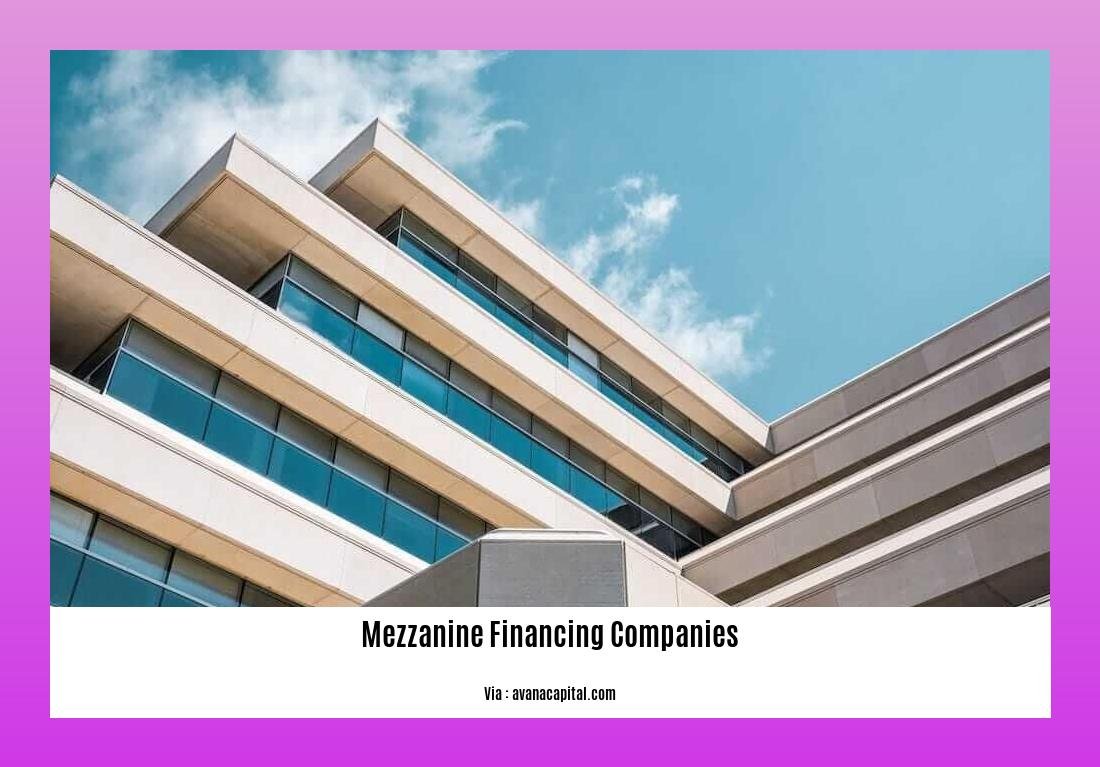Maximizing Returns: Exploring the Benefits and Considerations of Mezzanine Financing Companies
Are you a business owner looking for alternative financing options to fuel your company’s growth? If so, then understanding mezzanine financing could be the key to unlocking new opportunities. Mezzanine financing offers a unique blend of debt and equity, making it an attractive option for businesses in need of capital. In this article, we delve into the world of mezzanine financing, exploring its structure, advantages, and disadvantages. We also highlight some of the top mezzanine finance companies for real estate, providing you with valuable insights to help you make informed decisions. So, let’s dive in and discover how mezzanine financing can help maximize returns for your business.
Key Takeaways:
- Mezzanine financing is a unique and flexible option that lies between senior debt and equity financing.
- It can be structured as subordinated debt, preferred equity, or a combination of both.
- Mezzanine financing offers potential higher returns but carries higher risk compared to traditional debt.
- The cost of mezzanine financing is typically higher than traditional debt but lower than equity financing.
- Mezzanine financing provides a flexible capital structure and potential tax advantages for companies.
- Investors can benefit from the potential upside of equity ownership if mezzanine debt is converted into equity.
- Mezzanine financing helps companies access additional capital for growth initiatives without diluting ownership or giving up control.
- Companies should carefully assess their ability to meet interest payments and evaluate the impact on their overall capital structure.
- Mezzanine financing is a valuable option for companies seeking additional capital, but careful evaluation of risks and implications is necessary.
Mezzanine Financing Companies

Mezzanine financing companies play a crucial role in the world of finance, offering a unique and flexible option for businesses seeking additional funding. In this article, we will explore the benefits and considerations associated with mezzanine financing, shining a light on how these companies can help maximize returns for all stakeholders involved.
What Are Mezzanine Financing Companies?
Mezzanine financing companies specialize in providing a hybrid form of financing that falls between traditional debt and equity. They offer a range of financial solutions to businesses, serving as a bridge between senior debt and equity financing. This positioning allows them to cater to companies with diverse capital needs and risk profiles.
The Functions and Features of Mezzanine Financing Companies
Mezzanine financing companies offer a range of functions and features that separate them from traditional lenders. They provide capital to businesses looking to fuel growth, expand operations, or pursue strategic initiatives. By offering a blend of debt and equity features, these companies provide flexibility and potential higher returns for both companies and investors.
One unique feature of mezzanine financing is its ability to convert debt into equity if certain conditions are met. This allows companies to access additional funding without diluting ownership or giving up operational control. It also provides potential tax advantages, as the interest payments on mezzanine debt may be tax-deductible.
Qualifying for Mezzanine Financing
For businesses seeking mezzanine financing, it is essential to understand the criteria for qualification. Mezzanine financing companies typically require companies to have a solid track record and financial stability. This includes a proven revenue stream, positive cash flow, and a robust business plan outlining growth potential.
Additionally, mezzanine financing companies may assess the management team’s experience and industry knowledge to determine the overall viability of the business. The ability to fulfill interest payments and evaluate the potential impact on the company’s overall capital structure is also crucial.
The Application Process
The application process for mezzanine financing varies from company to company. However, it generally involves providing detailed financial information, including audited financial statements, income statements, balance sheets, and cash flow projections. Mezzanine financing companies will carefully analyze these documents to assess the financial health and viability of the business.
During the application process, it is important to clearly articulate the purpose of the funds and how they will contribute to the company’s growth strategy. Mezzanine financing companies will evaluate the potential risks and rewards associated with the investment, so it is crucial to provide a comprehensive and compelling case for funding.
The Potential Risks and Rewards
Mezzanine financing offers companies and investors a range of potential risks and rewards. On the positive side, mezzanine financing can provide flexible capital that supports growth initiatives without diluting ownership or giving up control. It also offers the potential for higher returns, helping investors diversify their portfolios and generate attractive yields.
However, it is important to note that mezzanine financing involves higher risk compared to traditional debt. The interest rates or returns on mezzanine financing are generally higher than traditional debt, reflecting the increased risk involved. Companies must carefully evaluate their ability to fulfill interest payments and analyze the potential impact on their overall capital structure.
Conclusion
Mezzanine financing companies offer a unique and flexible approach to capitalizing businesses. By providing a hybrid form of financing that combines debt and equity features, these companies enable companies to access additional funding for growth and strategic initiatives. While mezzanine financing presents potential benefits, it is crucial for businesses to carefully assess the associated risks and implications on their capital structure. With the help of experienced mezzanine financing companies, businesses can navigate this financing option and maximize returns for all stakeholders involved.
Sources:
-
Investopedia. Mezzanine Financing: What Mezzanine Debt Is and How It Works. Retrieved from here
-
Corporate Finance Institute. Mezzanine Financing – Overview, Rate of Return, Benefits. Retrieved from here
Check out the dimensions for mezzanine floors here: mezzanine floor dimensions
Discover the impressive height of mezzanine floors in feet: mezzanine floor height in feet
Explore the optimal height of mezzanine floors in meters: mezzanine floor height in meters
Uncover the precise height of mezzanine floors in millimeters: mezzanine floor height in mm
Advantages and Disadvantages of Mezzanine Financing

Mezzanine financing is a unique form of financing that offers both advantages and disadvantages to companies and investors. Before considering this option, it is crucial to understand the benefits and considerations associated with mezzanine financing.
Advantages of Mezzanine Financing
-
Flexibility in Capital Structure: Mezzanine financing provides companies with a flexible capital structure that can support their growth initiatives without diluting ownership or giving up operational control. This allows companies to access additional capital to fuel expansion and take advantage of new opportunities.
-
Higher Returns for Investors: Mezzanine financing offers potential higher returns for investors compared to traditional debt options. If the mezzanine debt is converted into equity, investors can benefit from the potential upside of equity ownership. This can help investors diversify their portfolios and generate attractive yields.
-
Tax Advantages: In some cases, the interest payments on mezzanine debt may be tax-deductible for companies. This can provide potential tax advantages and contribute to a more efficient capital structure.
-
Attractive Financing Option for Growth-Oriented Companies: Mezzanine financing is particularly suitable for companies with strong growth potential. It allows these companies to access capital without diluting their ownership or control, enabling them to pursue their growth plans more effectively.
Considerations of Mezzanine Financing
-
Higher Cost: Mezzanine financing is more expensive than traditional debt financing. The interest rates or returns on mezzanine financing are typically higher, reflecting the higher risk involved. Companies should carefully assess their ability to fulfill interest payments and consider the potential impact on their overall capital structure.
-
Potential Dilution of Equity: Mezzanine finance involves the issuance of securities that can dilute a company’s equity. If a borrower defaults on a mezzanine loan, the mezzanine lender may have the right to convert their loan into equity ownership or take control of the project. This potential dilution of equity may not be suitable for all companies.
-
Adjustable Interest Rates: Mezzanine financing often comes with adjustable interest rates, making it more challenging for companies to budget for their interest payments. Companies need to carefully consider their cash flow projections and analyze the potential impact of adjustable rates on their financial stability.
-
Higher Risk: Mezzanine financing is considered one of the highest-risk forms of debt. It bridges the gap between debt and equity financing, exposing investors and lenders to increased risk. Companies and investors must carefully evaluate the risks and implications on their capital structure before opting for mezzanine financing.
Overall, mezzanine financing can offer valuable benefits, such as flexibility in capital structure and higher returns for investors. However, it also comes with considerations, including higher costs, potential dilution of equity, adjustable interest rates, and higher risk. It is essential for companies and investors to weigh these advantages and disadvantages carefully and assess their suitability based on their specific needs and goals.
Key Takeaways:
- Mezzanine financing provides companies with a flexible capital structure and supports their growth initiatives.
- It offers higher potential returns for investors compared to traditional debt options.
- Mezzanine financing may have tax advantages, as interest payments can be tax-deductible.
- However, it is more expensive than traditional debt and may dilute a company’s equity.
- Mezzanine financing often comes with adjustable interest rates, making budgeting more challenging.
- It is considered a higher-risk form of debt financing.
SOURCES:
-
Investopedia. Mezzanine Financing: What Mezzanine Debt Is and How It Works. Retrieved from here
-
Corporate Finance Institute. Mezzanine Financing – Overview, Rate of Return, Benefits. Retrieved from here
Top Mezzanine Finance Companies for Real Estate
Mezzanine financing companies play a crucial role in the real estate industry, providing additional capital to fuel growth, development, and expansion. These companies offer a unique blend of debt and equity financing options, making them attractive to both companies seeking funding and investors looking for higher yields. In this article, we will explore the benefits and considerations of mezzanine financing companies for real estate, shedding light on their key features and functions.
Understanding Mezzanine Financing Companies
Mezzanine financing companies are financial institutions that specialize in providing capital that lies between senior debt and equity. They bridge the gap between traditional lending and equity investment, offering flexible financing options to companies in need of additional funds. These companies understand the complexities of real estate projects and have the expertise to evaluate the financial health and viability of businesses seeking funding.
Mezzanine financing companies, such as Avana Capital, NewSpring Foundation, FinanceBoston, Prime Commercial Lending, and Global Capital Partners Fund, have established themselves as top players in the industry. They have a track record of successfully structuring complex financial deals and partnering with businesses to meet their financing needs.
Benefits of Mezzanine Financing Companies
-
Flexible Capital Structure: Mezzanine financing companies provide companies with a flexible capital structure that suits their unique needs. These companies offer various financing options, such as subordinated debt and preferred equity, allowing companies to tailor their financing package to align with their growth strategies.
-
Higher Potential Returns: Mezzanine financing companies offer investors the opportunity for higher potential returns compared to traditional debt options. If the mezzanine debt is converted into equity, investors can benefit from the upside of equity ownership, enhancing their overall portfolio performance.
-
Tax Advantages: Mezzanine financing companies often structure their financing options in a way that allows companies to benefit from potential tax advantages. The interest payments on mezzanine debt may be tax-deductible, reducing the overall tax burden for companies.
-
Suitable for Growth-Oriented Companies: Mezzanine financing is particularly well-suited for growth-oriented companies. These companies often require additional capital to fund expansion plans, acquisitions, or strategic initiatives. Mezzanine financing companies can provide the necessary funding while maintaining the company’s operational control and ownership structure.
Considerations of Mezzanine Financing Companies
-
Higher Cost than Traditional Debt Financing: Mezzanine financing typically comes at a higher cost compared to traditional debt options. Companies should carefully evaluate the cost of capital and weigh it against the potential benefits before opting for mezzanine financing.
-
Potential Dilution of Equity: Mezzanine financing may result in the potential dilution of equity, as the lenders may have the right to convert the debt into an equity stake. Companies should carefully consider the impact on their ownership structure before entering into mezzanine financing arrangements.
-
Adjustable Interest Rates: Mezzanine financing often comes with adjustable interest rates, which can make budgeting and financial planning challenging for companies. It is important to carefully assess the cash flow implications of mezzanine debt and ensure that the company can fulfill interest payments.
-
Higher Risk Compared to Other Forms of Debt Financing: Mezzanine financing carries a higher level of risk compared to traditional debt financing options. Companies should carefully evaluate their ability to fulfill interest payments and assess the potential impact on their overall capital structure.
Key Takeaways:
- Mezzanine financing companies bridge the gap between senior debt and equity financing, offering flexible capital options for real estate projects.
- Top mezzanine financing companies, such as Avana Capital, NewSpring Foundation, FinanceBoston, Prime Commercial Lending, and Global Capital Partners Fund, have a track record of successful deal structuring and partnering with businesses.
- Mezzanine financing companies offer flexible capital structures, higher potential returns, tax advantages, and are suitable for growth-oriented companies.
- However, mezzanine financing companies come with higher costs, potential equity dilution, adjustable interest rates, and higher risk compared to traditional debt financing.
Sources:
- Avana Capital
- NewSpring Foundation
- FinanceBoston
- Prime Commercial Lending
- Global Capital Partners Fund
Now that we have explored the benefits and considerations of mezzanine financing companies for real estate, it becomes evident that they play a vital role in the industry. These companies offer the necessary capital and expertise to support companies’ growth and development while providing attractive investment opportunities for investors.
FAQ
Q1: What is mezzanine financing?
A1: Mezzanine financing refers to a type of capital that lies between senior debt and equity, combining features of both debt and equity financing.
Q2: How is mezzanine financing structured?
A2: Mezzanine financing can be structured in various forms, such as subordinated debt, preferred equity, or a combination of both, to suit the needs and goals of the company and its investors.
Q3: What are the advantages of mezzanine financing?
A3: Mezzanine financing offers companies a flexible capital structure, supporting growth initiatives without diluting ownership or giving up operational control. It may also provide potential tax advantages and higher returns for investors.
Q4: What are the disadvantages of mezzanine financing?
A4: Mezzanine financing carries higher risk compared to traditional debt, and companies should carefully assess their ability to fulfill interest payments and evaluate the potential impact on their overall capital structure.
Q5: Which are the top mezzanine finance companies for real estate?
A5: Some examples of top mezzanine finance companies for real estate include Avana Capital, NewSpring Foundation, FinanceBoston, Prime Commercial Lending, and Global Capital Partners Fund.
- Contemporary Kitchen Backsplash Ideas for a Stylish Home - December 20, 2025
- Modern Kitchen Backsplash Ideas To Inspire Your Refresh - December 19, 2025
- Modern Backsplash Ideas: A Guide to Todays Kitchen Trends - December 18, 2025










